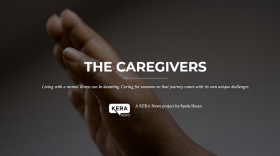On a Monday morning, 11th graders Kedar Kashyap and Marjan Tukdi left Centennial High School in Frisco to spend the day at Lawler Middle School across the street, teaching younger students about mental health.
"So we four stations happening right now," Tukdi said. "We have an introduction where we talk about HOSA, Stomp the Stigma, and why we're here, and then we have a fun activity... to improve their mood."
Kashyap and Tukdi are members of HOSA, a student organization for future health professionals. A few years ago, they got together with two other students in HOSA, 12th graders Shashank Easwar and Zaina Ghaffar. Together, they launched a mental health initiative called Stomp the Stigma. It started as an idea for a HOSA competition. Now, the group is trying to expand its reach.
A note to readers: this story mentions suicide. If you are in a crisis, please call the National Suicide Prevention Lifeline at 1-800-273-8255.
Last month, they hosted a volunteer event, writing holiday cards to patients in local psychiatric hospitals. They also marked World Suicide Prevention Day by leaving encouraging notes on classmates' lockers. Zaina Ghaffar says this is an issue that hits close to home for kids at Centennial High School. A few years ago, a student there died by suicide.
"Later we found out that it was because of mental illness," Ghaffar said."So that's why we wanted to make our initiative towards that, so something like that had less of a chance of happening again."

The loss shocked the student body. Kedar Kashyap says many of his classmates didn't know how to process the news, or even talk about it.
"The lack of a conversation is what gave us that jolt of cold water when this occurred," Kashyap said. "And we realized that there weren't enough people talking about it and people were just keeping it with themselves, and that was the issue."
But when they tried to spark a discussion, not everyone was receptive. Zaina Ghaffar says some students questioned the motivation behind Stomp the Stigma, whether they were just doing it for a HOSA competition.
"They'd never been exposed to anything like this, and then there wasn't really any way for them to talk about it until it happened," she said. "And so us starting it, they were just kind of like, 'oh, you're just doing it for your competition,' but it wasn't that reason at all."
It can be easier to talk about mental health and suicide risk in the abstract. It's tougher when you're a high school student, facing a loss close to home. Shashank Easwar says they tried to keep the conversation going at school, letting other students know that they were there to listen.
"When this all started, it was an open wound," Easwar said. "It was still very painful, and I think as we've moved away and people have gotten time to adjust, I think it's been a little more openly accepted."
Easwar says he's learned new ways to talk about mental health. When a classmate is struggling, he tries to lend an ear, empathize and validate what they're going through. He says a lot of kids are stressed by the expectations that come with high school.
"A lot of us especially are dealing with five, six AP classes at a time, plenty of extracurriculars, on top of that, maintaining personal relationships," he said, "In many instances, it can become too much."
Still, Easwar says conversations about mental health don't have to be all doom and gloom. He says that can turn people off.
"Especially when you're dealing with high school freshman, who are like 13, 14 years old, it may be too much to handle," Easwar said. "So I think just keeping that brighter light is more important than anything."





